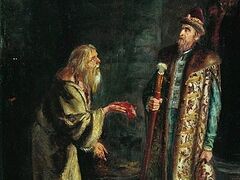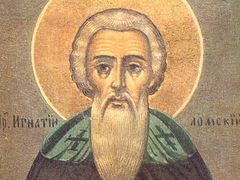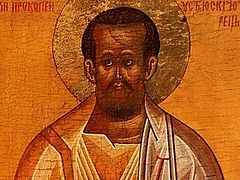St. Michael was descended from a boyar (noble) lineage, a kinsman of Grand Prince Dimitry Donskoy (1363-1389). He took upon himself the podvig of foolishness-for-Christ, leaving Moscow and arriving in rags at the Klops monastery, near Novgorod. No one knew how he got into the locked church where hieromonk Makary was censing the church at the 9th ode of the canon. But there sat a man in monastic garb, and under the light of a candle he wrote, copying from the Acts of the holy Apostles. After the end of Matins, the abbot and brethren came and asked the stranger: Who is he and what is his name? But he answered only by repeating their questions and did not reveal his origin.
In church the saint sang in the choir and read the Epistle, and at meals he read the Lives of the Saints. All who listened were moved by the beauty and spirituality of his reading. On the feast of the Transfiguration of the Lord, the Klops monastery was visited by prince Konstantin Dimitrievich (son of Grand Prince Dimitry Donskoy). After Communion, he was together with the princess at the refectory, while the unknown stranger read from the Book of Job. Hearing the reading, the prince approached the reader and, having looked him over, bowed down to him, calling him by name, his kinsman, Mikhail Maksimovich. The fool-for-Christ remarked: “The One, Only Creator knoweth of me, who I be”, but confirmed that his name was Michael.
The Monk Michael soon set example for the brethren in all the monastic efforts. He lived at the Klops monastery for forty-for years, exhausting his body in work, vigils and various deprivations, and he received from the Lord the gift of clairvoyance. He denounced people’s vices, not fearing the powerful of this world. He foretold the birth on January 22, 1440 of Grand Prince Ivan III (1462-1505), and the taking of Novgorod by him. He denounced prince Dimitry Shemyaka for blinding his brother, Grand Prince Vasily the Dark (1425-1462).
On a sandy spot, Monk Michael summoned forth a spring of water, having written upon the earth: “I shalt take up the cup of salvation (Ps. 115 [116]: 13), let a well-spring show forth on this spot.” And during a time of famine, the supplies of bread at the monastery granary did not diminish, though they distributed grain abundantly to the hungry.
Having indicated beforehand the place of his burial, the monk died on January 11 († c. 1453-1456).




